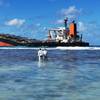On December 7, the Senate approved an emergency spending bill for homeland security as part of the Department of Defense FY'02 Appropriations bill. Although Senator Byrd (D-WVA) had to drop his additional funding for homeland security, $50 million for port security was included in the Senate-passed bill. An additional $50 million would be spent in FY '02 on Coast Guard ($12 million); Customs ($15 million), and the Maritime Administration (MARAD) ($23 million); $12 million of this would be for loan guarantees.
House/Senate negotiations on the final bill are expected to take place soon. The House version does provide money for Customs and Coast Guard, but does not fund MARAD's programs.
On Dec. 13, U.S. members of the American Association of Port Authorities (AAPA) sent the letter below to the conferees supporting the additional spending on port security, including:
-- The Senate proposal that $23 million be given to the Maritime Administration for a port security program. Since the Administration has expressed opposition to loan guarantees, however, AAPA will urge the conferees provide all the MARAD money as grants to public port authorities. AAPA also requested MARAD be authorized immediately to develop the grant program, because Senator Hollings' legislation (S. 1214) that authorizes this program is not expected to be enhanced soon.
-- AAPA supports the Senate funding level for the U.S. Coast Guard because it is significantly higher than the House level.
-- AAPA supports the House level for the U.S. Customs Service because it is higher, but too little of this increase is going to seaport security.
-- AAPA believes funding for the Federal Law Enforcement Training Center should be used, in part, to train law enforcement personnel and Customs agents on seaport security issues.
The full text of the letter from AAPA president Kurt J. Nagle follows:
Dear Chairman Byrd:
The American Association of Port Authorities (AAPA) would like to thank you for your leadership in negotiating $50 million for port security in the Senate-passed homeland security package that was attached to H.R. 3338. We urge the Conference Committee to enhance, or at a minimum maintain, this level of funding in the final agreement on this bill.
Protecting America's seaports must be an essential component of our national strategy to address homeland security, since 95% of our international trade transits through ports and our military relies on ports for mobilization and deployment of U.S. Armed Forces. This emergency spending will help Federal law enforcement agencies and public port authorities address these new challenges.
In the area of seaport security, the House bill includes supplemental funds for the U.S. Coast Guard and the U.S. Customs Service, but no funds are provided to help public port authorities enhance facility and operational security at ports. All three areas warrant additional funding - Coast Guard, Customs, and a Maritime Administration (MarAd) grant program for ports.
AAPA calls for the highest possible level of funding for all three programs. While we are encouraged that the Senate included funds for MarAd, both the low funding level and the lack of authorization for a grant program is of concern. AAPA encourages the conferees to allocate all the MarAd money for grants to ports, transferring funds from the loan guarantee program. Both the Administration and AAPA believe a grant program is more effective in helping ports secure their facilities. If additional money is available for homeland security, we also urge that additional grant funding be provided. Twenty-three million dollars for grants falls far short of the true needs of public ports.
Florida, which recently enacted its own seaport security law, estimates that it needs $80 million itself to make enhancements. Senator Hollings' legislation, S. 1214, calls for $80 million for grants and $35 million per year for loan guarantees, and the Interagency Commission on Crime and Security estimated that security enhancements would cost between $14 and $40 million per port, and this estimate was developed well before the events of September 11. States and local government are already spending significant funds on counterterrorism to address local vulnerabilities. Just as the Federal government has helped enhance security at other international borders - such as airports and land borders - it needs to provide sufficient funding to ports.
AAPA also urges the conferees to authorize this new MarAd grant program, and not require public ports to wait for separate authorizing legislation before getting Federal aid. Homeland security is a national priority, and seaports need to take action now. Senator Hollings' bill, while expected to pass the Senate, has not even been considered in the House. A nation at risk cannot wait.
U.S. public port authorities are being asked to do more now to address these new threats. In order to move quickly and effectively, ports need financial help from the Federal government. Since September 11, ports, like other key infrastructure facilities, have instituted heightened security measures and have spent significant amounts to increase security. A new grant program for ports will help secure facilities by providing funds for such items as access systems, gates, fencing, security cameras, personnel training, and other improvements to combat terrorism. Federally supported research and development programs could also be focused on ways to enhance security through technological advances, such as tamper-proof latches on containers to prevent terrorists from slipping weapons into a container.
AAPA also strongly endorses the Senate level for the Coast Guard and the House level for Customs. The U.S. Coast Guard and U.S. Customs Service take the lead in protecting America's ports by inspecting cargo and vessels. We do urge, however, that the conferees allocate more of the Customs money for seaport security. Traditionally, Customs has significantly understaffed seaports. Since 9/11, this problem has only gotten worse, with Customs staff being sent to airports and land borders. With 95% of international trade coming through ports, U.S. Customs must be given adequate resources to protect our nation from terrorist shipments.
The American Association of Port Authorities, which represents the leading ports in the Western Hemisphere, believes port security can be enhanced through a partnership approach in which the port industry and Federal government work in concert in addressing the terrorism threat to this nation. We urge that Federal funding and programs that focus on homeland security provide adequate money to ensure America's ports are protected.
Thank you again for your leadership on this critical issue of homeland security.
Sincerely,
Kurt J. Nagle, President
American Association of Port Authorities
Subscribe for
Maritime Reporter E-News
Maritime Reporter E-News is the maritime industry's largest circulation and most authoritative ENews Service, delivered to your Email five times per week










